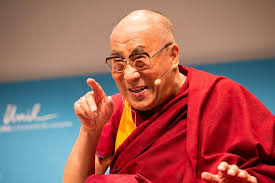
Is a little bit of fresh air blowing in Tibet after more than two decades of rigid policies by Beijing, and recently, around 120
self-immolations by Tibetans protesting those policies?
Maybe. (An ongoing, rare visit to Tibet by the United States ambassador to China, Gary Locke, is also piquing interest.)
Here are some
startling comments about a possible loosening of policy, from Tsering Namgyal, a writer and journalist based in New York, writing in Asia Sentinel earlier this week (Mr. Namgyal was citing the Tibetan language website Khabda.org.)
“In an abrupt and unexpected reversal of policy, Chinese government officials have told monks in some Tibetan areas that they are now free to ‘worship’ the Dalai Lama as a ‘religious leader,’” Mr. Namgyal wrote.
The policy is being described as an “experiment,” Mr. Namgyal wrote. Some monks have been told they can stop criticizing the Dalai Lama, as they have often been required to in the past, and can stop describing him as “a wolf in a monk’s robe,” said Mr. Namgyal, referring to an announcement apparently made at a meeting on June 14 in a Buddhist school in Qinghai province, at the appointment of a new Communist Party secretary. The meeting was attended by high-ranking ethnic Tibetan and Chinese officials, said Mr. Namgyal.
The goal? To separate the Dalai Lama’s religious and political roles.
“‘As a religious person, from now on you should respect and follow His Holiness the 14th Dalai Lama,” the new policy document cited by Mr. Namgyal ran, “but in terms of politics you are not allowed to do so. Politics and religion should go separate ways.”
Today, too, the United States ambassador Gary Locke is in Tibet, on a trip that began on June 25 and ends tomorrow, and was approved by the Chinese authorities, his first since becoming ambassador in 2011 and the first visit by a U.S. ambassador since 2010, said an embassy spokesman, Nolan Barkhouse.
Mr. Locke is visiting the Tibetan Autonomous Region “with members of his family and several officials from the embassy and consulate general in Chengdu,” said Mr. Barkhouse. “The purpose of this visit is to increase familiarity with local conditions in the Tibetan Autonomous Region and meet with officials and residents there,” he said.
Foreign reporters have long been barred from visiting Tibet except for infrequent, carefully-managed tours organized by officials, and Chinese reporters also face restrictions; diplomats have problems gaining access and even regular tourists, from time to time. Mr. Locke addressed that: he “discussed the importance opening up access to Tibet for U.S. diplomats and diplomats from other countries, for foreign journalists and foreign tourists,” said Mr. Barkhouse. “He also emphasized the importance of preserving the Tibetan people’s cultural heritage, including its unique linguistic, religion and cultural traditions.”
Next Saturday, July 6, is the Dalai Lama’s 78th birthday. For decades, hardline policy makers in Beijing are said to have believed that the eventual death of the Dalai Lama, (the spiritual leader of Tibetans has lived in exile since March 1959; here it says there were
fears he would be assassinated,) would help solve its problems in Tibet.
There has been speculation whether the new president, Xi Jinping, whose influential family has ties to Tibet and whose father is pictured below meeting with the Dalai Lama’s brother, 26 years ago, would be able to craft a new policy.
Mr. Xi’s predecessor, Hu Jintao, a party leader of Tibet before becoming president, was seen as a conservative on the Tibet issue.
Earlier this month, a voice from within the party establishment spoke about Tibet in an interview with the Hong Kong-based news magazine Yazhou Zhoukan. Jin Wei, a researcher at the Central Party School in Beijing, appeared to urge a more flexible policy.
As the power-holder in the region, the Communist Party – which is officially atheist and has long believed economic development would undermine opposition in Tibet –
must accept the central importance of non-material values to Tibetans, she was quoted as saying in the interview on this blog, in Chinese.
“If there can be new thinking and a breakthrough of the deadlock, not only would it further social stability and avoid the creation of hard-to-heal ethnic wounds, it would have a positive influence on other ethnic minorities in the country,” Ms. Jin said. And help improve China’s international image, she added.
Tibet isn’t the only part of this vast country where Beijing is having real trouble. Yesterday, 27 people were killed in Xinjiang, the far-western, mostly Muslim region, in a dawn “riot” that official media attributed to “
knife-wielding mobs” but Chinese analysts cited by the Global Times, a newspaper that is part of the People’s Daily Group, attributed to “
terrorists”.
Meanwhile, in a new report, Human Rights Watch says millions of Tibetans have been rehoused and relocated since 2006 as part the “Build a New Socialist Countryside” and “New Socialist Villages” campaigns. This link provides
aerial images of what the group says is the Tibetan countryside before and after, showing changes.
The 115-page report, “’They Say We Should Be Grateful’: Mass Rehousing and Relocation in Tibetan Areas of China,” documents extensive rights violations, the group said.


